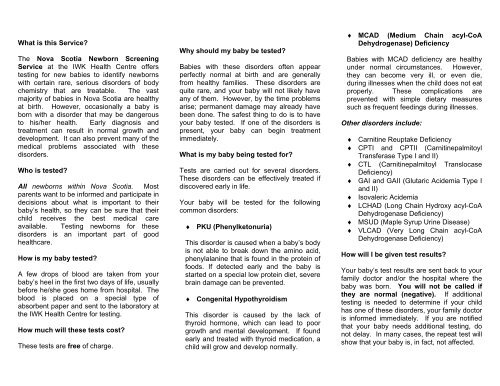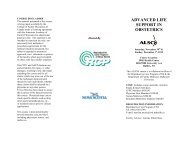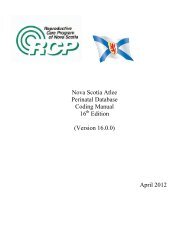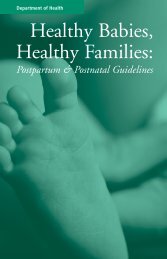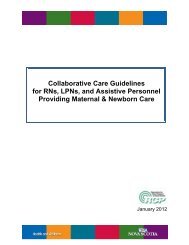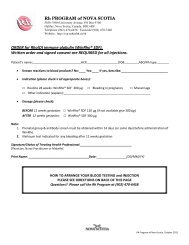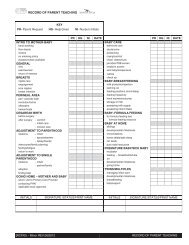Nova Scotia Newborn Screening Service Pamphlet - Reproductive ...
Nova Scotia Newborn Screening Service Pamphlet - Reproductive ...
Nova Scotia Newborn Screening Service Pamphlet - Reproductive ...
You also want an ePaper? Increase the reach of your titles
YUMPU automatically turns print PDFs into web optimized ePapers that Google loves.
What is this <strong>Service</strong><br />
The <strong>Nova</strong> <strong>Scotia</strong> <strong>Newborn</strong> <strong>Screening</strong><br />
<strong>Service</strong> at the IWK Health Centre offers<br />
testing for new babies to identify newborns<br />
with certain rare, serious disorders of body<br />
chemistry that are treatable. The vast<br />
majority of babies in <strong>Nova</strong> <strong>Scotia</strong> are healthy<br />
at birth. However, occasionally a baby is<br />
born with a disorder that may be dangerous<br />
to his/her health. Early diagnosis and<br />
treatment can result in normal growth and<br />
development. It can also prevent many of the<br />
medical problems associated with these<br />
disorders.<br />
Who is tested<br />
All newborns within <strong>Nova</strong> <strong>Scotia</strong>. Most<br />
parents want to be informed and participate in<br />
decisions about what is important to their<br />
baby’s health, so they can be sure that their<br />
child receives the best medical care<br />
available. Testing newborns for these<br />
disorders is an important part of good<br />
healthcare.<br />
How is my baby tested<br />
A few drops of blood are taken from your<br />
baby’s heel in the first two days of life, usually<br />
before he/she goes home from hospital. The<br />
blood is placed on a special type of<br />
absorbent paper and sent to the laboratory at<br />
the IWK Health Centre for testing.<br />
How much will these tests cost<br />
These tests are free of charge.<br />
Why should my baby be tested<br />
Babies with these disorders often appear<br />
perfectly normal at birth and are generally<br />
from healthy families. These disorders are<br />
quite rare, and your baby will not likely have<br />
any of them. However, by the time problems<br />
arise; permanent damage may already have<br />
been done. The safest thing to do is to have<br />
your baby tested. If one of the disorders is<br />
present, your baby can begin treatment<br />
immediately.<br />
What is my baby being tested for<br />
Tests are carried out for several disorders.<br />
These disorders can be effectively treated if<br />
discovered early in life.<br />
Your baby will be tested for the following<br />
common disorders:<br />
♦ PKU (Phenylketonuria)<br />
This disorder is caused when a baby’s body<br />
is not able to break down the amino acid,<br />
phenylalanine that is found in the protein of<br />
foods. If detected early and the baby is<br />
started on a special low protein diet, severe<br />
brain damage can be prevented.<br />
♦ Congenital Hypothyroidism<br />
This disorder is caused by the lack of<br />
thyroid hormone, which can lead to poor<br />
growth and mental development. If found<br />
early and treated with thyroid medication, a<br />
child will grow and develop normally.<br />
♦ MCAD (Medium Chain acyl-CoA<br />
Dehydrogenase) Deficiency<br />
Babies with MCAD deficiency are healthy<br />
under normal circumstances. However,<br />
they can become very ill, or even die,<br />
during illnesses when the child does not eat<br />
properly. These complications are<br />
prevented with simple dietary measures<br />
such as frequent feedings during illnesses.<br />
Other disorders include:<br />
♦ Carnitine Reuptake Deficiency<br />
♦ CPTI and CPTII (Carnitinepalmitoyl<br />
Transferase Type I and II)<br />
♦ CTL (Carnitinepalmitoyl Translocase<br />
Deficiency)<br />
♦ GAI and GAII (Glutaric Acidemia Type I<br />
and II)<br />
♦ Isovaleric Acidemia<br />
♦ LCHAD (Long Chain Hydroxy acyl-CoA<br />
Dehydrogenase Deficiency)<br />
♦ MSUD (Maple Syrup Urine Disease)<br />
♦ VLCAD (Very Long Chain acyl-CoA<br />
Dehydrogenase Deficiency)<br />
How will I be given test results<br />
Your baby’s test results are sent back to your<br />
family doctor and/or the hospital where the<br />
baby was born. You will not be called if<br />
they are normal (negative). If additional<br />
testing is needed to determine if your child<br />
has one of these disorders, your family doctor<br />
is informed immediately. If you are notified<br />
that your baby needs additional testing, do<br />
not delay. In many cases, the repeat test will<br />
show that your baby is, in fact, not affected.
I was called and told that my baby’s test<br />
needs to be repeated. Does this mean my<br />
baby has a disorder<br />
Not always. There are several reasons why<br />
your baby’s doctor may have asked to have<br />
your baby retested including:<br />
Unsatisfactory specimen: There was not<br />
enough blood to complete all the required<br />
screening tests, or the sample does not<br />
work for other reasons.<br />
“Too Early” specimen: If the blood<br />
specimen was taken before your baby was<br />
16 hours old, a second sample will have to<br />
be taken as soon as possible to ensure<br />
accurate test results.<br />
Abnormal Test Result: An initial positive<br />
test result does not mean that your baby has<br />
a disorder. It does mean that your baby<br />
needs further testing to determine whether or<br />
not he/she has one of these disorders.<br />
What does a “negative” test result mean<br />
A negative test results means your baby does<br />
not have any of the disorders he/she was<br />
screened for. <strong>Newborn</strong> screening only<br />
provides information about certain rare<br />
disorders of body chemistry. It is very<br />
important for your baby to have regular<br />
check-ups with your family doctor. This is an<br />
opportunity for you to talk about any concerns<br />
you have about your baby’s health.<br />
The <strong>Nova</strong> <strong>Scotia</strong> <strong>Newborn</strong> <strong>Screening</strong> <strong>Service</strong><br />
is designed to identify babies with rare,<br />
serious disorders within a few weeks of birth.<br />
This service has been available to <strong>Nova</strong><br />
<strong>Scotia</strong> families since 1979. Currently 99.9%<br />
of babies born in the province are being<br />
tested.<br />
As a parent, you can help to assure the<br />
health of your child and of the next<br />
generation by participating in the <strong>Newborn</strong><br />
<strong>Screening</strong> <strong>Service</strong>.<br />
If you have any questions, or would like<br />
additional information about the <strong>Screening</strong><br />
<strong>Service</strong>, please visit our website<br />
www.iwk.nshealth.ca or contact:<br />
<strong>Newborn</strong> <strong>Screening</strong> Coordinator<br />
IWK Health Centre<br />
5850/5980 University Ave., PO Box 9700<br />
Halifax, NS B3K 6R8<br />
Tel: (902) 470-7998<br />
Fax: (902) 470-6974<br />
<strong>Newborn</strong>ScreenCoord@iwk.nshealth.ca<br />
Supported by:<br />
The Department of Health, Government of <strong>Nova</strong><br />
<strong>Scotia</strong>, IWK Health Centre, and The <strong>Reproductive</strong><br />
Care Program of <strong>Nova</strong> <strong>Scotia</strong>.<br />
PL-0166 Last Updated: November 2008<br />
Next Review: November 2011<br />
IWK Health Centre


